Can Pigeons Eat Chicken Food?
If you have chicken and pigeons, feeding both birds the same food would be more convenient. After all, both are grain-eating domesticated birds. And since chicken feed is cheaper and readily available, it seems the perfect choice.
But can pigeons eat chicken food? In short, no. Chickens and pigeons have different dietary requirements, and their food is designed accordingly. Therefore, consuming chicken feed for a long time can cause nutritional deficiencies in pigeons.
You might wonder what can possibly go wrong if the pigeons eat chicken food. It’s just bird feed, and both are birds, right?
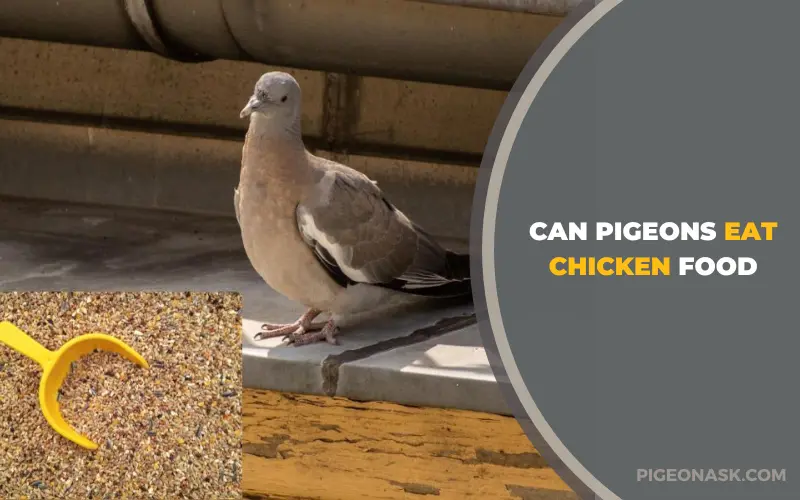
In that case, you must follow this discussion and see what harm you might’ve been doing to your pigeons.
Looking for more articles about pigeon food:
Can Pigeons Safely Consume Chicken Feed as Part of Their Diet?
The answer to this question isn’t a straightforward one. Chicken and pigeons are both grain-eating birds. Therefore, their foods have many ingredients in common.
So, pigeons can consume chicken feed once in a while, and it wouldn’t hurt them.
From that perspective, chicken feed isn’t toxic or unsafe for pigeons in that sense. However, chickens and pigeons have different nutritional requirements.
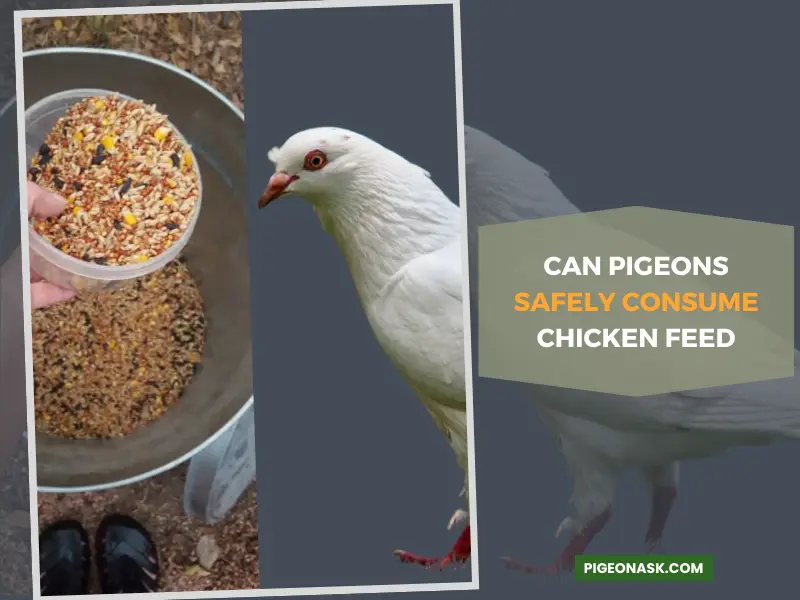
So, chicken feed lacks or has too much of some of the content for pigeons.
As a result, consuming chicken feed regularly can leave pigeons deficient in some of the essential nutrients. At the same time, they might overload on some ingredients their bodies don’t need and suffer consequences.
You must understand that these birds are usually bred for different purposes. People raise chickens exclusively for meat and eggs. Meanwhile, they keep pigeons for sports, shows, or pets. And their foods are designed accordingly.
We have covered an in-depth article on “Pigeon foods and Diet“; if interested, you can check this article here.
How Is Pigeon Food Different from Chicken Food?
Once you understand the difference between the two feeds, it becomes clearer why pigeons shouldn’t be consuming chicken food. The feed is different in terms of protein, blend, vitamins, minerals and form.
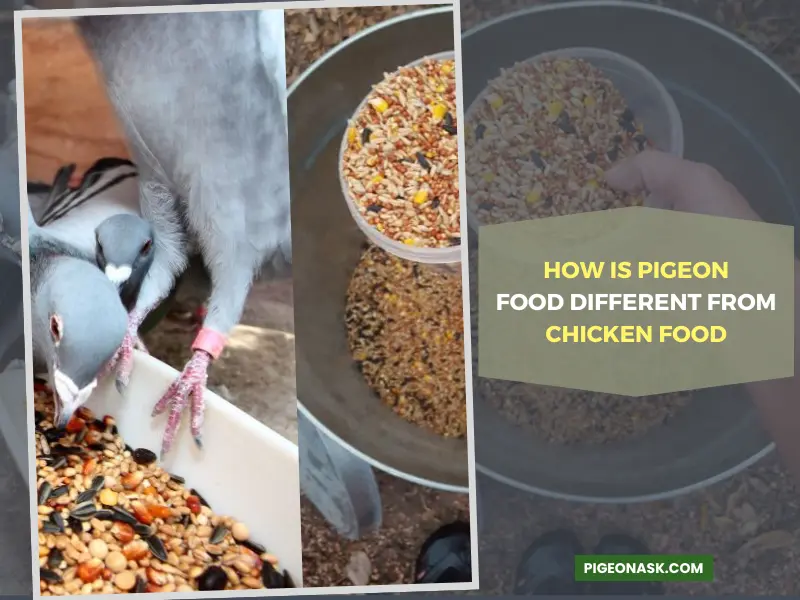
Protein Difference
Chicken feed has three main purposes. It helps the chicken grow fast, develop dense, high-quality muscle (or meat), and produce nutritious eggs. Therefore, chicken feed is full of protein.
For instance, starter chick feeds can contain 20g of protein per 100g of food to support rapid growth. Even full-grown adult chickens are fed a 17-18% protein diet to maintain their muscles.
In contrast, pigeons have much more slender bodies. Their growth patterns are less aggressive. Plus, oversized muscles can hinder their flight performance.
Therefore, their pigeon foods usually have 10-12g protein per 100g of food. So, you will be feeding your pigeons excess protein if you give them chicken food.
Blend of Ingredients
It’s true that chickens and pigeons both feed on grains and seeds. However, they have different preferences for those.
For instance, chicken feeds mostly corn, soybean meal, wheat, barley, etc. They might also contain some animal by-products.
Pigeon food also contains corn and wheat. However, these ingredients are in less processed form compared to chicken feed. Also, Pigeon feeds are richer in sunflower seeds, safflower seeds, peas and millet.
The difference in seeds and grains is reflected in the fiber content of both bird feeds. Chicken feed has 2-5% fiber content compared to 7-10% in that of pigeons’. In other words, chicken feed would be less digestible for pigeons.
Form of the Feed
Chickens are more domesticated birds than pigeons. Therefore, chicken feed is available in a more processed form.
For instance, most commercial chicken feed is sold in pelleted forms. Here, all the important ingredients are crushed and mixed to form pellets. This maximizes the intake of essential ingredients and reduces selective feeding.
On the other hand, Pigeon feed reflects the wild foraging nature of these birds. Therefore, instead of pellets, their feed is essentially a mixture of loose seeds.
This makes the feed more palatable and helps the pigeon pick seeds according to their nutritional cravings.
Vitamins and Minerals
Chicken and Pigeons contain almost all the same essential vitamins and minerals as each other. However, since the birds have slightly different requirements, the ratio of these nutrients might differ.
Some vitamins both feeds contain are Vit -A, D, E, K, B complex and C. These micronutrients help the birds’ development, maintenance and immune function.
Excess Vitamin D
However, chicken feed might have more vitamin D than pigeons need. Chicken are less capable of synthesizing Vitamin D from sun exposure than pigeons. Plus, they need it to produce eggs with quality shells.
On the other hand, pigeons have a slightly higher requirement for Vit- A, E, K and B complex compared to chickens. The vitamins help them recover from the stress of flying and increase sports performance.
Excess Calcium
The same is true for minerals in both birds’ feed. Some of the recurring minerals in their foods are calcium, phosphorus, sodium, magnesium, etc. But the amount is different.
For instance, Pigeon foods have less calcium than chickens since the birds don’t lay as many eggs and have lighter bone structures. So, the excess calcium in chicken food can cause various problems for them in the long term.
Meanwhile, the chicken feed might lack magnesium and other energy-yielding minerals that pigeons need for optimum flight performance.
What Are the Potential Risks of Feeding Pigeons Chicken Food?
If you keep feeding pigeons chicken food, they might experience several health problems in the long term. These include organ damage, reduced Immunity, bad feather quality, diminished flight performance and decreased lifespan.
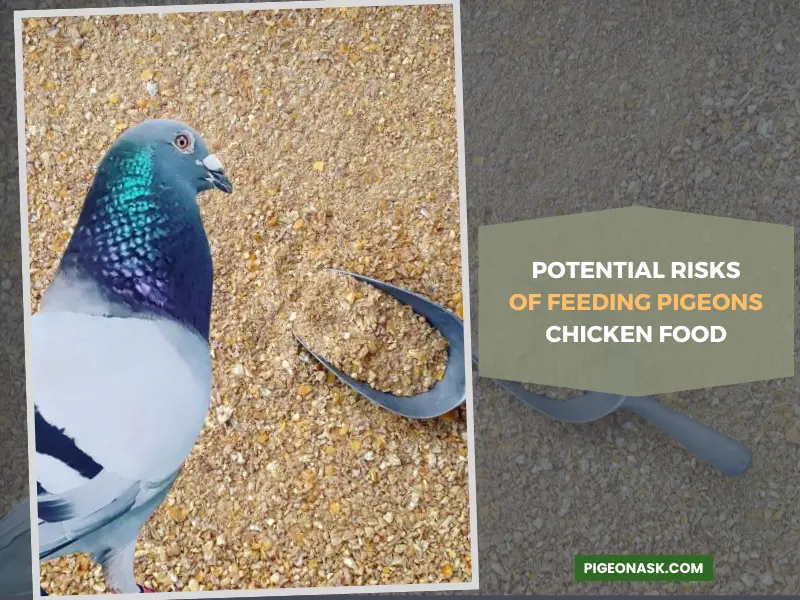
Organ Damage
The high protein and calcium content in chicken feed can lead to organ damage in pigeons.
For instance, excess protein consumption can cause liver damage. Meanwhile, too much calcium can produce stones in the pigeon’s kidney.
Poor Digestion
The lack of required dietary fiber in chicken food makes it less digestible for pigeons. This can lead to constipation.
Plus, the pigeons wouldn’t be able to absorb the food properly, resulting in nutritional deficiency.
Excess Body Weight
Chicken feed is designed to make the birds fat and plump so that they can yield good meat.
If pigeons regularly eat chicken food, they can become obese. This will compromise their flight performance.
Bad Feathers
Chicken feed lacks some of the nutrient’s pigeons need to maintain vibrant feathers. For instance, pigeons need more Vitamin A and E for feather health.
Also, pigeons obtain these vitamins from greens and seeds that chicken feed doesn’t have.
Reduced Immunity and lifespan
The lack of proper levels of minerals and vitamins can reduce the pigeon’s ability to fight diseases.
They would also have a hard time recovering from their flight sessions. Consequently, the birds will age fast and die early.
How to Adjust Chicken Feed for Pigeons?
So, it’s clear to you that feeding pigeons chicken food is an unhealthy practice. But what if you don’t have any other option?
Maybe all you could find in the stores were chicken feeds, or you couldn’t afford commercial pigeon feed. In some cases, your pigeons might develop a taste for chicken food and won’t eat anything else.
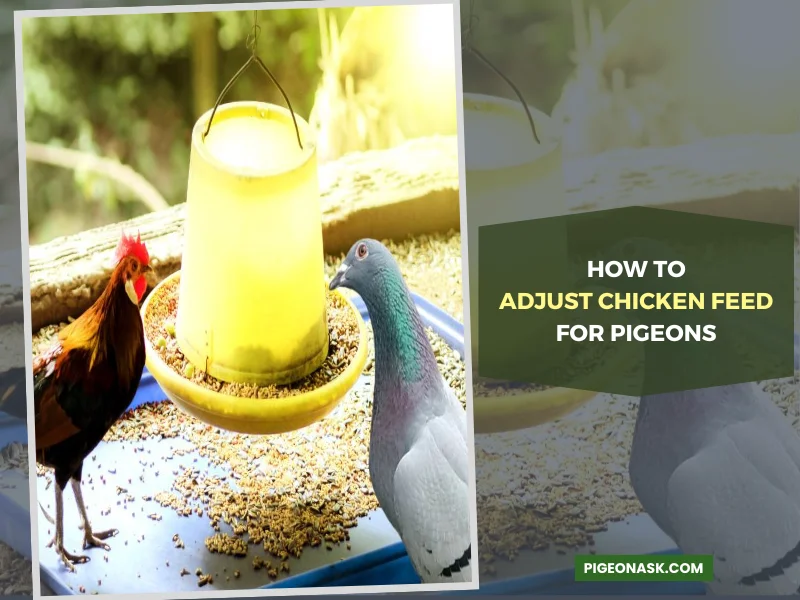
So, in that case, you can make a few adjustments to the chicken feed to make it more suitable for the pigeons. Here are a few tips –
- Mix millet, safflower and sunflower seeds into the chicken feed. This will make up for the fiber and nutritional deficiency.
- Add cracked corn to the chicken feed. It will lower the overall protein content down to suitable levels for the chicken.
- Incorporate leafy greens like lettuce and spinach with the feed to make up for the vitamins it lacks.
- Consult a veterinarian and add supplemental nutrients to the feed according to their advice.
- Monitor the pigeon’s behavior, flight performance and feathers to see how they are reacting to the feed. Lethargy, distress, and change in the color and consistency of dropping are cause for alarm.
Conclusion
Hopefully, it’s clear whether you can feed pigeons chicken food. If your pigeons would otherwise starve, go ahead and give them chicken feed.
However, don’t make a habit out of it and switch to commercial pigeon feeds as soon as possible. You might also choose to make your own pigeon food by mixing the proper seeds, grains and greens.
That’s all for this discussion. Share this knowledge to help other pigeon owners. And connect with us on Facebook, Twitter and Pinterest for more content like this.
References:
- https://poultry.extension.org/articles/feeds-and-feeding-of-poultry/basic-poultry-nutrition/
- https://nre.tas.gov.au/biosecurity-tasmania/animal-biosecurity/animal-health/poultry-and-pigeons
- https://www.merckvetmanual.com/poultry/nutrition-and-management-poultry/nutritional-requirements-of-poultry
Image Credit:
- Canva.com/photos
